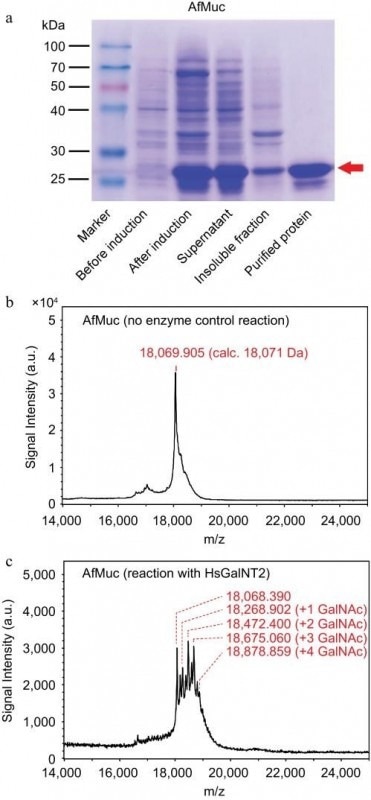The first recombinant mucin protein obtained from the Edible-nest Swiftlet Aerodramus fuciphagus (AfMuc) has been successfully identified and synthesized by a research team. The study sheds light on the glycosylation mechanism of EBN mucin, which may have significant ramifications for nutrition and food biotechnology.
 Purification and in vitro glycosylation of AfMuc. Image Credit: Cheng, G., et al.
Purification and in vitro glycosylation of AfMuc. Image Credit: Cheng, G., et al.
EBN, also referred to as the “Caviar of the East,” is among the priciest food items, frequently costing thousands of dollars per kg. These nests, which are traditionally obtained from Southeast Asia, are high in complex carbohydrates, proteins, and vital amino acids.
However, EBN has only been a luxury available to wealthy customers because of its exorbitant cost and limited supply. To create a synthetic, affordable substitute, researchers have recently attempted to duplicate the functional elements of EBN using biotechnological techniques. One significant development is the capacity to use recombinant methods to duplicate the bioactive mucins present in EBN.
A study that was published in Food Materials Research provides a way to make edible bird's nest (EBN), a costly and uncommon delicacy, more widely available.
In this work, two important enzymes, AfGalNT2 (from Aerodramus fuciphagus) and HsGalNT2 (from humans), were expressed in bacterial systems to investigate their expression and function.
Western blot examination verified that a tiny amount of proteins were soluble, even though the majority were insoluble. Muc1 and EA2, glycopeptide substrates, were effectively glycosylated by the purified enzymes utilizing UDP-GalNAc or UDP-GlcNAc as sugar donors.
Despite exhibiting modest conversion rates (less than 10%), the incorporation of a galactosylation step using a bacterial enzyme showed promise in producing distinct glycan structures. Both enzymes demonstrated maximum activity at a pH of 7.0 and an ideal temperature of 30 °C, according to additional biochemical analysis.
The swiftlet enzyme provided distinct advantages in the glycosylation process, which is essential for simulating the natural structure and functionality of EBN mucins, although both enzymes had comparable activity patterns.
Furthermore, it was shown that the most efficient activator for glycosylation processes was divalent manganese ions (Mn2+), with smaller effects from Co2+, Mg2+ , and Ca2+ Mass spectrometry monitoring the glycosylation of the recombinantly expressed mucin protein AfMuc revealed the inclusion of up to four GalNAc residues, further verifying the effective in vitro glycosylation of the mucin backbone.
Our work represents a pivotal step in making the health benefits of edible bird’s nest available to a wider population. By producing recombinant EBN mucin in the lab, we can now explore large-scale production techniques that could significantly reduce costs while maintaining the functional properties of the original product.”
Dr. Li Liu, Study Lead Researcher, Chinese Academy of Sciences
A significant advancement in the biotechnological manufacturing of edible bird's nest components is presented in this work. Researchers have cleared the path for the economical and scalable manufacturing of this highly valued treat by effectively producing and glycosylating the AfMuc protein.
With additional research, recombinant EBN mucins have the potential to completely transform the food and nutraceutical sectors by lowering the environmental effect of conventional harvesting techniques while providing the health advantages of EBN to a worldwide audience.
Source:
Journal reference:
Cheng, G., et al. (2024) Expression and in vitro glycosylation of recombinant edible bird nest (EBN) mucin. Food Materials Research. doi.org/10.48130/fmr-0023-0037.